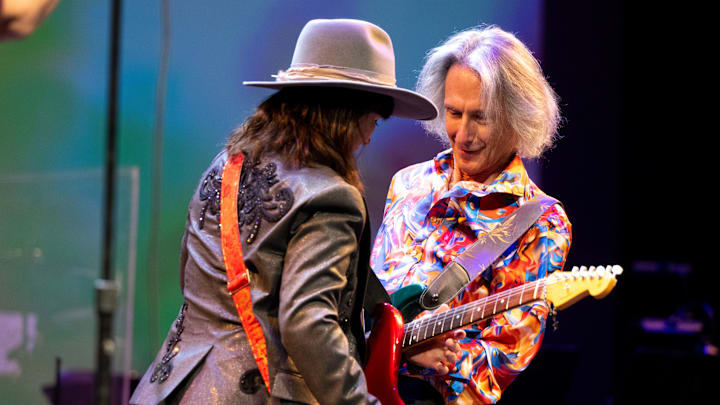The West Coast
Here are the Sonics by the Sonics (1965)
The Sonics didn’t invent Seattle grunge. But virtually every major name from that movement cited the quintet from Tacoma as a major inspiration. They had a fast guitar player in Larry Parypa; his brother Andy and Bob Bennett provided a pounding rhythm on bass and drums respectively. Gerry Roslie was a tough-sounding singer, and they even had Rob Lind, who could wail on sax. They do a no-holds-barred Motown cover of the Contour's “Do You Love Me” and an equally aggressive Chuck Berry tune, “Roll Over Beethoven.”
Roslie wrote a few of the songs, like album-opener “The Witch” and “Psycho,” which kicked off side 2. He was mostly copying the Motown style, just roughing up the sound with some screaming and distortion. The rest of the debut offered messy, energetic, and captivating covers of songs like “Money,” “The Night Time is the Right Time,” and “Good Golly Miss Molly.”
More than anything, the Sonics showed how you could take a good song, play it loud and play it fast, and get a crowd on its feet. While the Monks were planting the seeds of punk on the continent, the Sonics were doing the same thing on the other side of the world. As with many of the bands discussed so far, the original Sonics didn’t last long after their debut, but they have been rediscovered multiple times over the years – any time a new movement is based on attitude and passion, the Sonics are usually hanging out somewhere in the DNA.
Moby Grape by Moby Grape (1967)
San Fran psychedelia is usually remembered as the birthing ground of iconic bands like Jefferson Airplane and the Grateful Dead. In 1967. Moby Grape was as good as any of them. Maybe better. They had three guitars. Every member of the quintet could play, could sing, and could write. Lead guitarist Jerry Miller and drummer Don Stevenson got things started on their debut with “Hey Grandma,” a perfect up-tempo pop rocker that allowed for plenty of quick guitar flourishes and country-style harmonizing.
Then it was bass player Bob Mosely’s turn to slow things down with the funky “Mr. Blues,” still keeping those guitars and harmonizing. Second guitarist Peter Lewis steps in with the solid rock groove of “Fall on You” before Miller and Stevenson show off their acoustic folk chops on the lovely “8:05.”
And we haven’t gotten to Moby Grape’s most unique voice. Guitarist Skip Spence doesn’t get a song into the mix until late on side 1. “Omaha” is as San-Franny as anything Jefferson Airplane was doing at the time. (Spence briefly played drums for Airplane.) Spence also closes the album with “Indifference,” a guitar rocker that could easily have come from the Dead.
Sadly, Spence would follow a similar trajectory as another visionary musician from England, Syd Barrett. Like Barrett, Spence struggled with substance abuse and mental health issues that seriously curtailed his career. He died of cancer in 1999. Moby Grape put out several more albums in the late ‘60s, but the deterioration and eventual departure of Spence signaled the end.
(Turn On) The Music Machine by the Music Machine (1966)
The Music Machine’s one big hit, “Talk Talk” was included in the original Nuggets album, as were tracks from several of the other bands mentioned above. They were fronted by singer/guitarist Sean Bonniwell and had the jazz influences of keyboardist Doug Rhodes, adding to the basic garage rock mix. “Talk Talk,” written by Bonniwell, was an ideal example of his desire to make music with “fuzz and fangs.”
The Music Machine also did trippy covers of Neil Diamond (“Cherry, Cherry”) and George Harrison (“Taxman”), with Bonniwell contributing stylized vocals and Rhodes always adding flourishes. That approach isn’t as successful on “96 Tears,” which was already stylized garage, but it works surprisingly well on a spaced-out version of “Hey Joe,” which closes the album.
Bonniwell’s original “The People in Me” could have been a hit but only “Talk Talk” caught on at the time. The original band put out one more album, but it was more of a Bonniwell effort, as suggested by the new name, The Bonniwell Music Machine.
